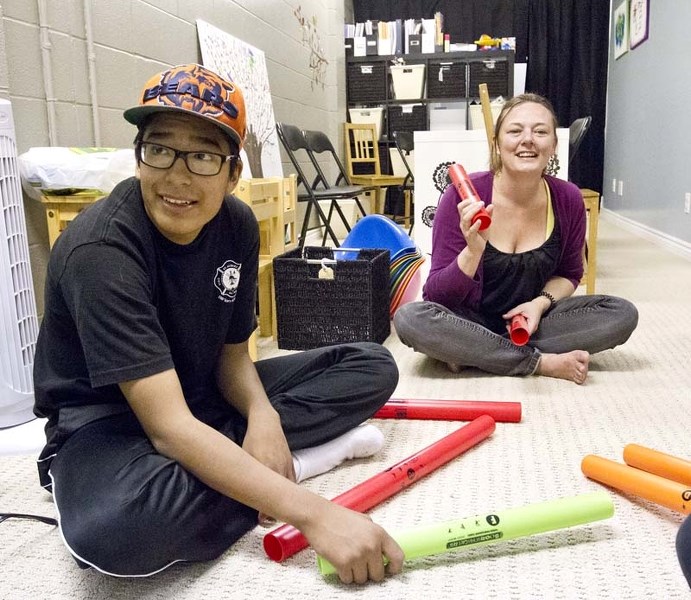For St. Albert mother Michelle Gillespie, raising a child with Fetal Alcohol Spectrum Disorder (FASD) has been nothing short of a challenge.
Her 14-year-old son Tharren (Cabry) went missing in August from the Boys and Girls Club in Wetaskiwin, where he was living in a specialized group home for kids with FASD.
Although Tharren was safely returned home three days later, Gillespie said this incident sheds light on the gaps in the provincial system of Family Support for Children with Disabilities (FSCD).
She explained there was "no rhyme or reason" as to why Tharren went missing (other than it was a bad choice on his part). However the real issue with the system, she said, is navigating community programs available to families, one of which is respite care.
"FSCD can support me out the yin yang, but if you can't get the resources … that's why my child is in Wetaskiwin and not in Edmonton or St. Albert."
For families of children with disabilities ranging from developmental disorders such as Autism and Down Syndrome, to sensory impairment, FSCD provides funding and referrals to specialized services (occupational therapy or speech- language pathology) and community programs based on each child's need.
Gillespie said the hardest part for her family has been finding qualified respite care workers to provide temporary childcare since Tharren is on the high end of the spectrum of need.
Before being moved to the group home, Tharren was living with his family in St. Albert.
"Unless he was sleeping, all hell was breaking loose," Gillespie described of her 14-year-old's temper tantrums that he would have six to seven times per day.
"He was like the Tasmanian devil after school and our house was a giant ball of turmoil. Everyone was a jailer and a keeper."
She said finding respite workers that can take care of a child like Tharren has been taxing.
"Everybody babysits little kids … but the kid who is in the backyard making weird noises and hitting his head, they are scary kids."
Sheila Chisholm is a former respite worker and the founder of the St. Albert based social inclusion group Infinite Resources. She said the problem isn't that there is a lack of respite workers, but a lack of ones who have specialized training.
"Yes ,there is some form of training, but there is no training for if a kid smears poop in their hands and grabs you by the hair," she said. "There isn't a foundation of what a respite worker should be."
The province has no set criteria for what qualifications a respite worker should have.
At Infinite Resources, which runs music and art programs for disabled kids from two to 17 years of age, only highly trained staff and volunteers provide respite care.
Chisholm said her agency runs on the help of volunteers, who range from junior high and high school students to nursing students and occupational therapists. She explained having volunteers do temporary child care may lead to fast burnout, but having professionals volunteer their time to train staff might be the answer.
"Working with kids – whether neurotypical or a room full of kindergarten kids – is exhausting," she admitted. "You have to be so filled up with energy and be willing to give all your energy away to those kids."
Getting creative
Terra Bell, a mother of two autistic children aged six and eight, said respite care has contributed to her sanity as well as her kids'.
"After school, having two of them that go in opposite directions, it's tough to make dinner. Sometimes just having someone come in from 4 to 6 p.m. and just be my extra eyes and ears is good."
Bell said she has been lucky being able to find qualified respite workers but knows it can be tough for other parents, which is why she began compiling a list of respite agencies and workers that specialize in care for autistic children.
The Namao resident started a Facebook group in 2011 for parents with autistic children in the Edmonton area in order to better connect them with each other as well as community supports, from the best service providers for autistic children to pediatric dentists and even hairdressers. The Facebook group now has more than 400 members.
To solve their own respite care dilemma, the Gillespie family has gotten creative in their own way by having their two older children provide night care for Tharren when he's at home.
According to Roxanne Gerbrandt, a senior manager with FSCD, the program sometimes approves relatives as respite care workers and compensates them for it.
"For some families the relative is most appropriate. If there is a language barrier or if the child has some specific unique needs … sometimes the relative might be the best person to do that," she said, adding there are no provincially established rates for respite.
Gillespie said she still sees families advertising on Kijiji for respite care workers, which highlights the need for them.
"More people have to be willing to get involved," added Gillespie. "For every kid like mine there are 10 kids that aren't that high (level), which I don't think are getting all the supports they need because there isn't the staffing."




